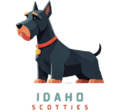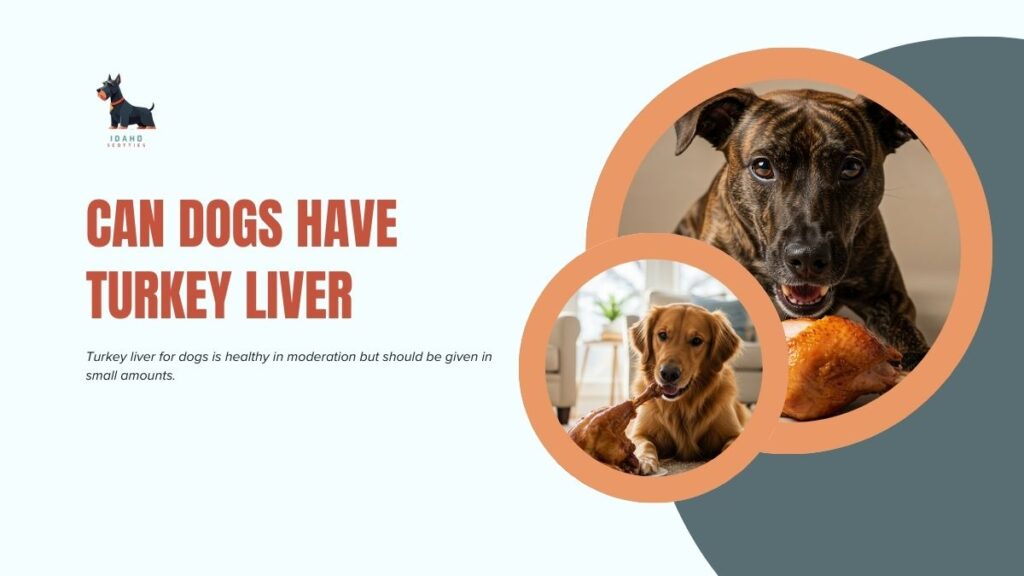As you cook Thanksgiving dinner, your dog watches, hoping for a taste. You might wonder, “Can dogs have turkey liver?”
Liver is full of good stuff like vitamins and protein—more than regular meat! But just like too much candy isn’t good for us, too much turkey liver can be bad for your dog.
The good news? A little bit of cooked turkey liver is a safe and tasty treat. Just don’t overdo it, and your pup will be happy and healthy!
Can Dogs Have Turkey Liver?
Yes, dogs can have turkey liver in moderation. It’s good for them because it’s full of protein and vitamins. But too much can cause problems like upset stomach or bone issues.
Always cook it well and give it as an occasional treat. Keep the portions small, and if you’re unsure, check with your vet.
Nutritional Benefits of Turkey Liver for Dogs

Turkey liver is a healthy, tasty treat for dogs, packed with nutrients that support overall health. Here’s why it’s great for your pup:
Protein
Helps build and repair muscles, keeping your dog strong.
Vitamins
- Vitamin A: Good for your dog’s eyes, immune system, and skin.
- B Vitamins: Boosts energy, supports brain health, and aids digestion.
Minerals
- Iron: Keeps blood healthy and gives your dog more energy.
- Zinc: Helps the immune system, heals wounds, and keeps skin and coat healthy.
- Copper & Phosphorus: Support strong bones and organs.
Low in Fat
A lean treat that’s good for your dog’s weight.
Omega-3s
Help keep joints healthy and coats shiny.
Turkey liver is a great snack in moderation. Too much can be too rich for your dog, so just a small amount is enough to give them a healthy boost!
Potential Risks of Feeding Turkey Liver to Dogs

Thinking about feeding your dog turkey liver? Before you do, it’s important to know the potential risks and how it might affect their health!
Vitamin A Toxicity
Why it’s a problem:
- Turkey liver is very rich in vitamin A, and excessive intake can overwhelm your dog’s system.
What happens:
- Chronic excess can lead to serious health issues such as bone malformations, muscle weakness, and even vision problems. In extreme cases, it can be fatal.
How to avoid it:
- Limit liver to small, controlled portions, and avoid feeding it daily. Consult with your vet if you’re unsure about how much is safe.
High Fat Content
Why it’s a problem:
- Turkey liver is high in fat, and some dogs, especially those prone to obesity, are more vulnerable to the effects of excess fat.
What happens:
- In addition to pancreatitis, excess fat can contribute to the development of cardiovascular problems or obesity, particularly in less active dogs.
How to avoid it:
- Use liver as an occasional treat and adjust your dog’s main meals to accommodate any extra calories. Always monitor your dog’s weight and adjust fat intake accordingly.
Nutritional Imbalance
Why it’s a problem:
- Despite being nutrient-dense, liver lacks other essential components such as fiber and carbohydrates that are needed for overall health.
What happens:
- An imbalance can lead to gastrointestinal issues like constipation, poor digestion, or a deficiency in vital nutrients like vitamins D and E, which are important for bone health and immune function.
How to avoid it:
- Supplement liver with a variety of other healthy foods, ensuring a more balanced intake of all nutrients. Incorporate vegetables, grains, and other proteins into your dog’s diet.
Bacterial Contamination
Why it’s a problem:
- Raw turkey liver can contain harmful bacteria such as Salmonella, Campylobacter, or E. coli, which pose risks to both dogs and humans.
What happens:
- Infection from these bacteria can cause severe gastrointestinal distress, fever, and in some cases, sepsis. Dogs with compromised immune systems are especially at risk.
How to avoid it:
- Always freeze raw liver before cooking to kill parasites, and cook it thoroughly to ensure all harmful bacteria are eliminated. Avoid cross-contamination by washing hands and utensils after handling raw meat.
Potential Allergies
Why it’s a problem:
- Turkey is considered a common allergen for some dogs, especially those with a history of food allergies or sensitivities.
What happens:
- Allergic reactions can range from mild symptoms like itching to severe reactions such as anaphylaxis, where the dog may have difficulty breathing or swelling.
How to avoid it:
- If your dog has known food allergies, avoid turkey altogether. Introduce turkey liver gradually to monitor for adverse reactions. Always consult a vet before trying new foods.
High Purine Content
Why it’s a problem:
- Purines are compounds found in turkey liver that can stress the kidneys, especially in dogs predisposed to kidney disease or bladder stones.
What happens:
- The body converts purines into uric acid, which can lead to painful conditions like gout or the formation of bladder or kidney stones.
How to avoid it:
- Limit liver in dogs with kidney or urinary tract issues. If your dog has a history of stones or kidney problems, consult your vet about whether liver should be part of their diet.
Overfeeding or Lack of Variety
Why it’s a problem:
- Relying too heavily on liver can limit the variety of nutrients your dog gets from other sources, leading to long-term nutritional deficiencies.
What happens:
- Overfeeding liver can cause vitamin toxicity, imbalance in fatty acids, and a lack of essential vitamins and minerals that your dog’s body needs for optimal health.
How to avoid it:
- Ensure liver is part of a diversified diet. Rotate different protein sources and include a wide range of nutrients, especially for growing puppies or aging dogs with special dietary needs.
Digestive Issues
Why it’s a problem:
- Due to its richness, liver can be hard for some dogs to digest, especially those with pre-existing gastrointestinal conditions.
What happens:
- If your dog has a sensitive stomach, liver may cause discomfort, leading to chronic digestive issues like bloating, constipation, or diarrhea.
How to avoid it:
- Gradually introduce liver into their diet in small, manageable amounts. If your dog experiences digestive upset, discontinue or limit liver treats and consider other protein sources for their meals.
How to Safely Feed Turkey Liver to Dogs?

Feeding turkey liver to your dog can be a great treat, but it’s important to do it safely. Here’s how:
Portion Control
- Small dogs: 1-2 small pieces per week.
- Large dogs: 2-3 small pieces per week.
- Liver should only be about 5-10% of your dog’s diet to avoid health issues.
Cooking Methods
- Best ways: Boil, bake, or steam—just plain, with no oils, salt, or seasoning.
- Avoid: Frying or adding butter, as extra fat can upset your dog’s stomach.
Introduce Slowly
- Start with a tiny piece and see how your dog reacts.
- If they handle it well, you can slowly add a little more over time.
Keeping portions small and cooking it the right way will make turkey liver a safe and healthy treat for your pup!
Raw vs. Cooked Turkey Liver: Which Is Better?

When feeding your dog turkey liver, you might wonder if raw or cooked is better. Here’s what to know:
Raw Turkey Liver
- Good: Keeps all its natural nutrients.
- Bad: Can have bacteria like Salmonella, which can make dogs and humans sick. It also spoils quickly.
Cooked Turkey Liver
- Good: Cooking makes it safer by killing bacteria. It’s also easier to digest.
- Bad: Some nutrients are lost during cooking, but it’s still very healthy.
What’s Best?
- Vets recommend cooking turkey liver to avoid health risks. Boiling or steaming it keeps most of the nutrients while making it safe to eat.
No matter how you prepare it, always start with small amounts and feed it in moderation!
Alternative to Turkey for Dogs

Looking for an alternative to turkey for your dog’s diet? Here are some healthy options that are just as tasty and safe for your furry friend!
Other Organ Meats
- Chicken Liver: Great source of iron and vitamin A. It’s milder in taste than turkey liver.
- Beef Liver: Full of nutrients like vitamin A and iron. Has a stronger taste than turkey liver.
- Kidney (Beef, Lamb, or Pork): High in protein and vitamins. It’s less common but still a good choice.
Liver-Based Dog Treats
- Store-Bought Liver Treats: Convenient and often freeze-dried or dehydrated. They come in different types like chicken or beef.
- Dehydrated Liver: Nutrient-rich treats with no added preservatives or fillers.
Plant-Based Alternatives
- Carrots: Packed with vitamin A. A good veggie option but not quite like liver.
- Sweet Potatoes: Full of fiber and vitamins A and C. A solid plant-based choice.
- Spinach & Kale: Loaded with vitamins and minerals, they’re a healthy addition.
Conclusion
Turkey liver is full of good nutrients like iron and vitamin A, which are great for your dog. But it’s important to feed it in moderation because too much can cause problems, like vitamin A toxicity. Always cook it well to avoid any bacteria.
Final Advice
Before adding any new food to your dog’s diet—like turkey liver or other alternatives—talk to your vet first. They can help you figure out the right amount to keep your dog healthy.
If this guide was helpful, share it with other dog owners to spread the word about safe feeding.
Frequently Asked Questions
Can a dog eat cooked turkey liver?
Yes, dogs can eat cooked turkey liver. It’s healthy for them, full of nutrients like iron and vitamin A. Just make sure it’s cooked all the way through and feed it in moderation to avoid giving them too much vitamin A.
What type of liver is best for dogs?
Turkey liver is great for dogs, but chicken and beef liver are also good options. They all offer good nutrients. The best liver depends on what your dog likes and any dietary needs they might have.
How to cook turkey liver and heart for dogs?
To cook turkey liver and heart:
Rinse them well.
Cut them into small pieces.
Boil or simmer them (don’t fry or add any seasoning).
Let them cool before serving.
You can also freeze portions for later.
Is cooked liver safe for dogs?
Yes, cooked liver is safe for dogs when prepared correctly. Just make sure it’s fully cooked and fed in small amounts. Too much liver can cause health problems, so moderation is key.
Pet trainer with a passion for helping animals and owners build strong, loving bonds through positive reinforcement and expert care.



